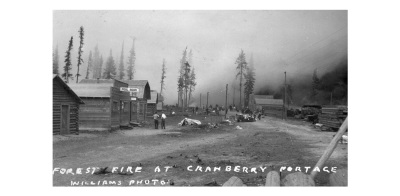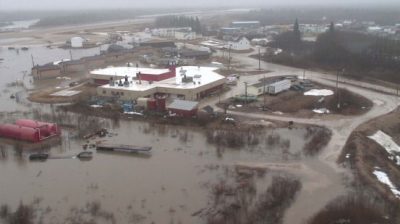
“Forest Fire at Cranberry Portage” Manitoba, 1929. Photograph by Williams held at LAC
Something I have thought a lot about while working my way through the Canadian Disaster Database (CDD) over the past few weeks is just how invisible Indigenous peoples are in the data, even though so many of the disasters I am reading about have impacted Indigenous communities the hardest. For example, I just wrote about the terrible flooding in the James Bay area in 2008 that caused Fort Albany First Nation and Kashechewan First Nation to be airlifted and evacuated. In the CDD’s entry on the event, they do not mention that Fort Albany and Kashechewan are First Nations (plus Kashechewan was spelled wrong throughout.) This is a huge oversight on the part of the CDD and results in a lack of important contextualization on the event. We know that the impacts of disasters disproportionately impact marginalized communities, such as First Nations, and we need to be cognizant of that as researchers.

An aerial view shows a flooded section of Fort Albany on Sunday, April 27, 2008. (Jay Sutherland for CTV.ca)
Against the backdrop of this work on “historic” disasters, we’ve been living through a variety of contemporary ones as well. I sit in my safe and temperature-controlled home in Ottawa?, but outside there are heat waves and a hazy sky for weeks on end from forest fires in Northern Ontario. I think about how terrible the forest fires are across Canada this year, and how they will only keep getting worse as we see an exponential increase of the effects of climate change. My research with the Disaster Lab shows me that this isn’t new though. Forest fires have been getting worse for years.
I am reminded of a recent post from my best friend, Alison, who is a Burnaby City Councillor and the person I turn to on all things on climate change. In response to MP Jonathan Wilkinson stating that “We [the federal government] will continue to fight climate change,” Alison responded, “Really wish *the Minister of Environment and Climate Change* knew the difference between fighting climate change and adapting to it.”
I feel like I don’t know how to fight it or adapt to it, and in the face of the climate disaster and a never ending pandemic, I sometimes feel like this research is unimportant. How can I be digging into the past when we need to be focused on the present and future? But I know that this kind of work might help show the patterns that arise in the face of disaster, and I do hope that the work will have a positive impact in the future.
But it is hard to feel hopeful during a disaster.
– MA Candidate, Valerie Wood